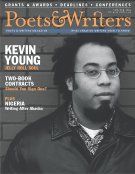Habila was lucky, and got a job as an assistant lecturer in English at Federal Polytechnic in Bauchi, a job he held for two years. While there, he also wrote a biography of the chief of his hometown, which was published by Tafawa Balewa Press in 1997, and a draft of a novel, "Prison Stories," a collection of interwoven stories about a young journalist working in the darkest days of the Abacha years.
In 1998 General Abacha died of a heart attack, and democracy returned to Nigeria. By then Habila was ready to move on in his career. He went to the capital city of Lagos, where he found work, first writing stories of love and intrigue for a romance magazine called Hints, then as the arts editor at the Vanguard, Nigeria's fourth-largest daily paper. He continued to work on his poems and short stories, and in 2000 he won two of the country's biggest awards—the Musical Society of Nigeria (MuSon) Poetry Festival Prize for his poem "Another Age" and the Liberty Bank Prize for his short story "The Butterfly and the Artist." He also reworked "Prison Stories" and scrounged up enough money to self-publish it under the title Waiting for an Angel.
That same year, Habila saw a notice posted at the Association of Nigerian Authors for the Caine Prize for African Writing, which had been founded the previous year in honor of longtime Booker Prize chairman Sir Michael Caine. The award was being judged by a panel of African writers including J.M. Coetzee and Buchi Emecheta.
Posing as his own publisher—which he was—Habila submitted a chapter from Angel called "Love Poems." When the Caine Prize committee wrote back to tell Habila's publisher that he'd been shortlisted, he replied anonymously. "Thanks for your mail. We'll let the author know of the good news immediately. We hope that God will guide the judges in their choice." Habila won the $15,000 award, and Norton will publish Waiting for an Angel this month.
Habila recently arrived at the School of English and American Studies at the University of East Anglia, in Norwich, England, where he received a two-year writer's fellowship. I spoke to him at his home.
You were a journalist, like the main character, Lomba, in Waiting for an Angel. Was he based on your own experiences?
Partly.
It's my first novel, and I think most first novels tend to draw a lot
from the writer's experiences; you have not learned to distance
yourself yet. So I created this character who is a journalist like me,
and an aspiring writer like me—young like me, because it would be easy
for me to understand his psyche. The novel is set during the Abacha
years, but I wasn't a journalist during the Abacha years. So all those
things he went through I imagined.
Like the arrests and bombings?
Exactly.
But that is the way I would have behaved if I had been there, I think.
Any young person with that character or with that state of mind, that
is the way he would have behaved in that situation. I tried to bring an
ordinary person into extraordinary circumstances.
Did you know people, journalists, who lived through the Abacha years?
Oh yeah. Lots of my friends—poets and writers.
What did they tell you about it?
Oh, fantastic stories. A friend of mine came to England for a writers
conference, and when he was going back he couldn't go through the
airports in Nigeria. He had to go through Ghana, because the security
at the airports was very, very tight. And anybody who happened to be a
kind of intellectual was suspected, and you could be detained. So this
guy went through Ghana, and then took a car to the border. And when he
was searched by the army officers, they saw a picture of him with Wole
Soyinka. And Wole Soyinka was a very vocal critic of the government and
he was in exile at that time.









